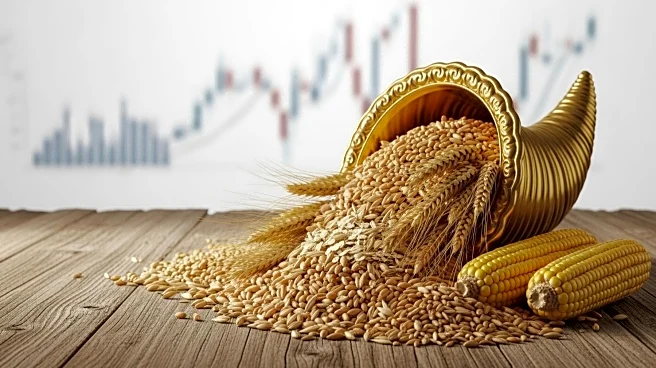What is the story about?
What's Happening?
Archer Daniels Midland (ADM), a major player in the global food processing industry, is experiencing market pressure due to recent developments in Argentina. Argentina has announced the elimination of export taxes on grain, including soybeans, which has provided China with an alternative source to U.S. agricultural products. This move comes amid ongoing trade tensions between the U.S. and China, with China opting to purchase soybeans from Argentina instead of the U.S. The U.S. Department of Agriculture (USDA) reported that soybean and grain futures were lower in overnight trading, influenced by harvest pressure and Argentina's policy change. The USDA also noted that the U.S. soybean harvest is progressing, with 9% completed as of Sunday, and the corn harvest is 11% complete. However, export inspections for soybeans and corn have declined, further impacting market prices.
Why It's Important?
The elimination of export taxes by Argentina is significant as it alters the competitive landscape for U.S. agricultural exports, particularly soybeans. With China being the world's largest importer of soybeans, its decision to purchase from Argentina instead of the U.S. could have substantial economic implications for American farmers and the agricultural sector. This development may exacerbate the existing trade tensions between the U.S. and China, potentially affecting future negotiations and trade agreements. The decline in export inspections and futures prices also indicates potential challenges for U.S. agricultural producers in maintaining their market share and profitability.
What's Next?
The ongoing trade dynamics between the U.S. and China are likely to continue influencing the agricultural market. Stakeholders, including U.S. farmers and agricultural companies like ADM, may need to explore alternative markets or strategies to mitigate the impact of reduced exports to China. Additionally, the upcoming meeting between President Trump and Xi Jinping at the end of October could provide an opportunity for discussions on trade issues, although the outcome remains uncertain. The USDA will continue to monitor harvest progress and export trends, which will be crucial for assessing the future market conditions.
Beyond the Headlines
The decision by Argentina to eliminate export taxes may have broader implications for global agricultural trade policies, potentially encouraging other countries to reconsider their export strategies. This shift could lead to increased competition among major agricultural exporters, impacting global commodity prices and trade flows. Furthermore, the environmental and economic policies in Argentina could influence its agricultural production capacity and sustainability, affecting long-term supply dynamics.














